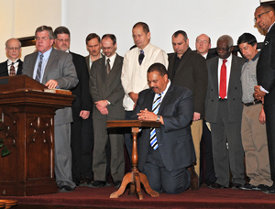Can you call your pastor by his or her first name only and feel comfortable doing so?
Body
Discussion
Should pastors be entrepreneurial leaders or servants of souls?
Body
Discussion
Washington Wants a Say Over Your Minister
Body
Discussion
Priorities of an Internship
 Republished, with permission, from Voice magazine, May-June, 2011.
Republished, with permission, from Voice magazine, May-June, 2011.
It was a difficult telephone call to receive. It was 1983 and I was graduating with my Master of Divinity from Capital Bible Seminary. I had sent my resume to various IFCA members with whom I had become somewhat familiar, asking them if they would be willing to send it to churches they knew were looking for pastors. Pastor Bob Gray from Westchester Bible Church, a former President of the IFCA, was calling. I had sent him one of my resumes. He said, “I received your resume last week and I am sorry to tell you that I cannot send it on to any churches.” I was dumb-founded. I asked him what was the problem? He said, “I can’t send it along because I believe that it is God’s will for you to come to Westchester and serve a residency here for three years.” I was immediately relieved and amused!
But my immediate attitude was “Thanks, but no thanks!” I had already served in a variety of internships: at Limerick Chapel, I had served for three consecutive summers; at Bob Jones University, I served an internship with Dr. Tony Miller in a church plant at Clemson University; at Capital Bible Seminary, I had served as an intern to Pastor Sam Martz in the church plant at New Carrollton Bible Church. I had grown up in a pastor’s home and thought that I had had enough “mentoring.”
I thanked him, but told him that I felt called to preach and that I was looking for my own pulpit ministry. He asked me to at least pray about it. I half-heartedly told him that I would. As soon as I hung up with him, I called my father who hesitated not and declared, “Do it!” I said, “But Dad…” and he interrupted and said, “You won’t regret it.”
It was such a powerful time in my life, that as soon as I finished my residency with Pastor Gray, and took the ministry at Byron Center Bible Church, I purposed to begin a residency program for young men coming out of seminary. From 1986 to 1998, I prepared myself to serve as a mentor to young men who would be able to come and serve with me. During those twelve years, there were four areas of priority that I sought to develop at the church: personal maturity, leadership vision, congregational maturity, and financial support.
Discussion
Report: Women ministers gaining ground in Baptist life
Body
Discussion
"The allegations only make Long's sermons more powerful."
Body
Discussion
The Ordination of Men to the Ministry
 Reprinted with permission from Faith Pulpit (Jan-Mar, 2011). Photo: Baptist Bulletin.
Reprinted with permission from Faith Pulpit (Jan-Mar, 2011). Photo: Baptist Bulletin.
Ordination to the gospel ministry is a significant and solemn event in a man’s life.1 Churches should understand the Biblical teaching about ordination so they can conduct the procedure in a proper manner.
The General Pattern
Ordinations today generally follow the same pattern. The church, after observing its pastor or assistant pastor for a period of time, decides to call a council to consider the advisability of ordaining him. In addition to some of its own members,2 the church usually seeks the input of men from area churches.3 On the designated day the church and the council members convene to hear the candidate give his salvation testimony, state his call to the ministry, and express his doctrinal positions. In most cases, the individual prepares a written statement of each doctrine. During the session the candidate summarizes his views on each doctrine, followed by questions from the council members.
After the examination, the candidate is dismissed and the council members share their thoughts on the man. If the council is satisfied that he evidences a call to the ministry and is orthodox in his theology, it recommends to the church that it proceed with the ordination. The church then votes to ordain their pastor or assistant pastor at an upcoming service.
At the end of the ordination service, the deacons and ordained men in the congregation lay their hands on the man, formally setting him aside for the ministry.

Discussion